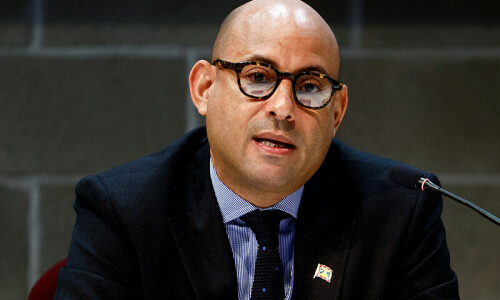• Naveed Qamar meets Aurangzeb to push for amendments
• Federal cabinet likely to approve revised Finance Bill today
• Most contentious clause involves FBR’s expanded powers
• Nearly half of NA panel’s suggestions incorporated
• PM holds one-on-one meetings with MNAs to secure support for budget
ISLAMABAD: The Pakistan Peoples Party (PPP) on Wednesday voiced strong reservations over a set of politically unpopular provisions in the federal budget for the next fiscal year, urging the government to amend contentious clauses ahead of its expected approval in the National Assembly today (Thursday).
Former finance minister and PPP MNA Naveed Qamar, who currently chairs the National Assembly Standing Committee on Finance and Revenue, met Finance Minister Muhammad Aurangzeb in a bid to build consensus on key provisions of the Finance Bill 2025.
With the clock ticking down to the National Assembly’s decisive vote on the Finance Bill on Thursday, tensions within the ruling coalition have intensified. Prime Minister Shehbaz Sharif has meanwhile ramped up individual meetings with MNAs in the lead-up to the bill’s presentation in parliament.
According to a source in the Prime Minister’s Secretariat, the premier has been meeting five to six MNAs daily since the budget was presented — excluding days he is abroad.
Each meeting typically lasts around 10 minutes and is aimed at ensuring parliamentary attendance and addressing individual concerns. “This is an incentive for an MNA to meet the premier,” the source said, adding that, as a result, MNAs have also been attending the budget sessions in greater numbers.
Mr Aurangzeb and Minister of State for Finance Bilal Azhar Kiani did not respond to messages or calls for comment.
Mr Qamar told Dawn that the final draft of the Finance Bill reflects the recommendations put forth by the standing committee. He stated that the finance committee must first approve these amendments before they are presented for final voting.
He acknowledged the PPP’s opposition to the Federal Board of Revenue’s (FBR) proposed arrest powers for tax officials, saying the issue remained under discussion with the PML-N and would be addressed before the final vote.
Another source said the federal government is set to convene a cabinet meeting today to approve the revised Finance Bill. This marks the first time the government has incorporated nearly half of the standing committee’s recommendations into the final draft. The cabinet will endorse the revised version of the Finance Bill before presenting it to parliament for a vote.
The most contentious clause involves expanded powers for the FBR, particularly the authority to arrest and prosecute individuals in sales tax fraud cases. A compromise was reached following a proposal by PPP Senator Farooq H. Naek, with revised provisions now expected to be included in the final version.
Another controversial measure links the purchase of property and vehicles to a person’s declared income in their wealth statement. While the government has raised the threshold, the PPP argues the provision remains politically unpopular and may negatively impact the real estate sector.
A third sticking point concerns business registration under the sales tax regime. Initially, it was proposed that non-compliant businesses would face disconnection of utility services or closure. However, the government has since introduced a revised version of the proposal.
NA Finance Committee
In a departure from past practice, the chairmanship of the National Assembly Standing Committee on Finance now lies with a member of a coalition partner rather than the ruling party. More significantly, this is the first time the committee has conducted a clause-by-clause review of the Finance Bill.
Mr Qamar, the committee chairman, told Dawn this change was made possible through an amendment to Rule 122 of the Rules of Procedure and Conduct of Business in the National Assembly, 2007 — introduced in September 2024 and moved by him.
The change, unanimously endorsed by the Standing Committee on Rules of Procedure and Privileges, mandates that the Finance Bill be referred to the National Assembly’s Standing Committee on Finance and Revenue before passage, with a report due within 15 days.
As per past practice, the Finance Bill is laid before the Senate, where the chairman refers it to the Senate Committee on Finance and Revenue.
Meanwhile, the National Assembly typically passes the budget around 28 days later, following extensive debate and discussion. However, the Senate committee’s recommendations are non-binding and have largely gone unheeded during the passage of the final Finance Bill.
In contrast, recommendations from the National Assembly are mandatory, reflecting a growing empowerment of the lower house in the budget-making process. Currently, the chairman of the Senate Committee on Finance and Revenue is also a PPP senator, Saleem Mandviwalla.
As a result of this amendment, during the National Assembly’s budget session 2025, Mr Qamar presented the committee’s first detailed report on the Finance Bill, which aims to give effect to the federal government’s fiscal proposals for the year beginning July 1.
Mr Qamar described the development as a landmark achievement, marking the first time parliament has been empowered to engage in budget deliberations at a micro level.
He noted that committee members were consistently present and actively participated in detailed discussions on the Finance Bill. He added that the government had accepted most of the committee’s recommendations, despite being constrained by the IMF programme.
“This is no longer a rubber-stamp process,” Mr Qamar said, adding that the process had been shifted from the hands of the bureaucracy to the representatives of the people in parliament.
Published in Dawn, June 26th, 2025











































